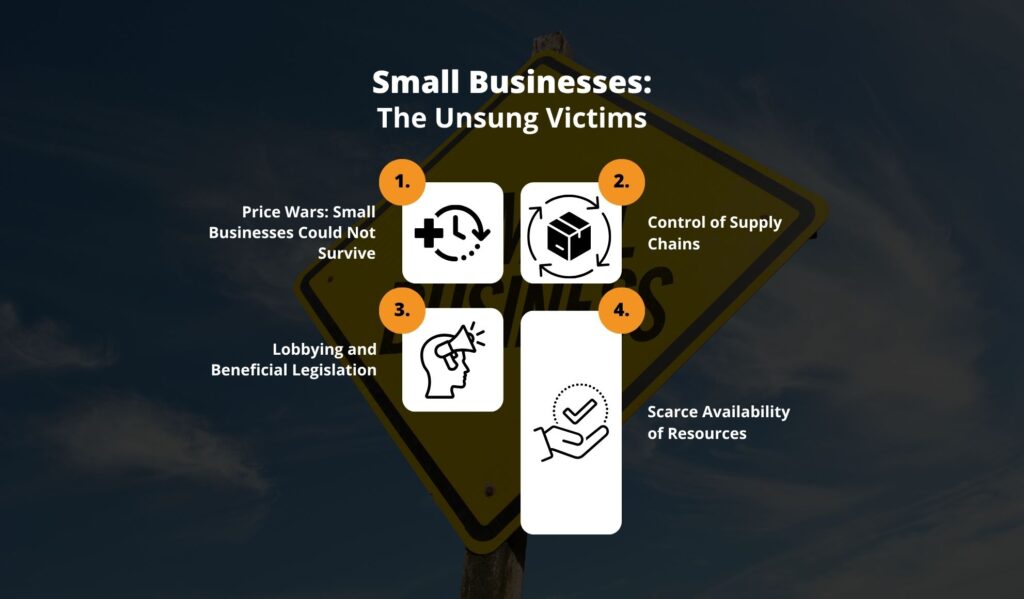In The Gilded Age, How Did Monopolies Affect Many Small Businesses: A Lesson From My MBA Class
by Barsha Bhattacharya Small Business 29 May 2025

When I was pursuing my MBA degree, there used to be a class on economic history that is still much remembered.
One day, our teacher, a lively and intelligent person with the ability to make history interesting, began the class with a question that immediately caught our attention:
“in the gilded age, how did monopolies affect many small businesses?”
He then presented four options to select from:
A. Monopolies helped small businesses.
B. Monopolies caused small companies to close.
C. Monopolies did not affect small businesses.
D. Monopolies gave customers to small businesses.
We all stood stock-still. Some of us began to whisper, others scrambled to scan their notes. This was not just a trivia question—it exposed a major change in American business.
The real answer to “In the gilded age, how did monopolies affect many small businesses?” is much more fascinating (and horrible) than a letter on an exam.
Let’s examine what actually occurred during the Gilded Age and how the monopolies changed the face of business, for better or worse.
What was the Gilded Age?

To start with, the Gilded Age was an era in American history that lasted from the 1870s until about 1900.
It was a period of accelerated business and economic growth, and a lot of gilded success was masking a lot of real problems beneath.
With railroads expanding throughout the nation and cities growing, there was an increase in corruption, income disparities, and business takeovers.
In these decades, there were among the most well-known individuals in American business—John D. Rockefeller, Andrew Carnegie, Cornelius Vanderbilt, and J.P. Morgan—each constructing enormous firms in oil, steel, railroads, and banking.
However, the interesting part is that their success wasn’t a success for everybody all the time.
What is a Monopoly, Anyway?
A monopoly is when a single company gains so much dominance in its market that it pushes out all other companies. This company gets to choose any price, however much it is, and do as it wants.
This is beneficial for the owner of the monopoly, but not for the smaller businesses struggling to survive in the same market.
Small Businesses: The Unsung Victims

Therefore, during the Gilded Age, what did monopolies do to most small businesses? The truthful response is the following: they crushed them.
Let’s break it down:
1. Price Wars: Small Businesses Could Not Survive
Giant monopolies reaped vast profits from their gigantic size. They could sell goods very cheaply—sometimes below cost—just to eliminate their competition.
Small businesses, with fewer customers and less money, could not compete. After they had eliminated the competition, the monopoly would then increase prices again. It’s an old trap.
2. Control of Supply Chains
Consider Rockefeller’s Standard Oil, for instance. Not only did it yield a great amount of oil, but it also dominated the methods of oil shipping, refining, and selling.
If some small enterprise required any of those services, it had to take Standard Oil’s terms and conditions. Such domination made it extremely difficult for new or small enterprises to thrive.
3. Lobbying and Beneficial Legislation
Monopolies did not merely compete in the market—they also influenced legislation. Through their vast fortunes, they could lobby for legislation favorable to large businesses and create barriers for small businesses.
In some cases, they even received tax subsidies or land grants, further tilting the playing field.
4. Scarce Availability of Resources
Monopolies kept small businesses away from the money they required, be it raw materials, railway lines, or loans.
At times, they entered into exclusive agreements with suppliers and banks, and others found it difficult to survive.
Real-Life Examples That Speak for Themselves

Let’s take a look at some examples from history to make this more concrete:
Standard Oil employed strong-arm tactics to push out tiny refineries. If you wouldn’t sell to Rockefeller, he’d either undercut your prices, forcing you out of business, or purchase the railroads you’d use to ship your product.
Andrew Carnegie’s steel company profited by reducing expenses and dominating the entire process.
Small steel mills could not match his capacity to produce and sell at lower costs because he was huge and controlled everything that went into production.
Railroad monopolies such as those controlled by Vanderbilt charged various shippers various rates—benefiting the large customers and disadvantaging the small companies.
Certain local towns and industries were excluded completely if they did not deal with the large businesses.
And how did they react?
Back in our MBA classroom, after a few minutes of whispers as we talked amongst ourselves, our professor finally revealed the answer to his question:
B. Monopolies led to small businesses closing down.
He didn’t merely say it—he demonstrated it with anecdotes, statistics, and a pinch of passion that really made the argument bite.
It wasn’t merely that there were monopolies—it’s that they functioned in a manner that didn’t permit others to compete.
And that competition came most often from small businesses, operated by honest, hardworking individuals who merely wanted to have a fair shake.
That particular day, I understood how things were different for anyone attempting to start a business at that time.
It was like working hard on your business, only to be pushed down by a giant corporation with unlimited resources. It wasn’t business—it was survival.
The Pushback: Antitrust and the Sherman Act
Luckily, it didn’t end there. When people began to resent monopolies, the government finally stepped in.
In 1890, they enacted the Sherman Antitrust Act to combat unfair business tactics. It was far from perfect, but it was a start. Eventually, this law and others began to dismantle monopolies and restore some fairness.
One of the most legendary events? The breakup of Standard Oil in 1911, when it was split into 34 smaller firms. This was a turning point in the way the U.S. dealt with corporate power.
Lessons for Today’s Entrepreneurs

The Gilded Age is history, but the lessons to be learned from it are very pertinent today. During that period, giants like Standard Oil and Carnegie Steel harmed small businesses by controlling the prices they charged.
They even started manipulating the supply and exerting political influence. These giants did not just win; they made it hard for small businesses to survive.
What does this imply for businesses today?
Even now, we see the same tendencies. Big computer companies, big internet retailers, and big businesses are likely to dominate entire markets, and so it is difficult for small companies to compete.
But unlike during the Gilded Age, businesspeople in today’s world have choices such as social media, niche marketing, and websites with which to compete, at least partially.
The lesson, in short? Knowledge is a powerful force. Understanding how monopolies have harmed small companies in the past can help modern-day entrepreneurs recognize unfair practices, adapt quickly, and develop more effective and innovative strategies.
It also teaches us why we need to encourage good policies and antitrust laws that maintain a healthy competition.
Short and sweet, the Gilded Age reminds us that unbridled power can stifle innovation, but intelligence, savvy, and responsible entrepreneurship can flourish with a positive attitude and advanced technology.
Wrapping It Up!
So, let’s get back to that old friend: In the gilded age, how did monopolies affect many small businesses?
They didn’t compete—They dominated. They shut down paths for innovation, pushed out local businesses, and concentrated power within a few hands.
Learning about this part of history is not limited to school—it serves as a reminder of how much we truly need honest business and fair competition.
Whether you’re a schoolchild, a businessman or woman, or simply someone interested in how business operates, the Gilded Age is a powerful story— and a cautionary tale —about what happens when power is unchecked.
And so, I leave you with the same question my professor asked us—but you already know the answer.
Also read



































































































